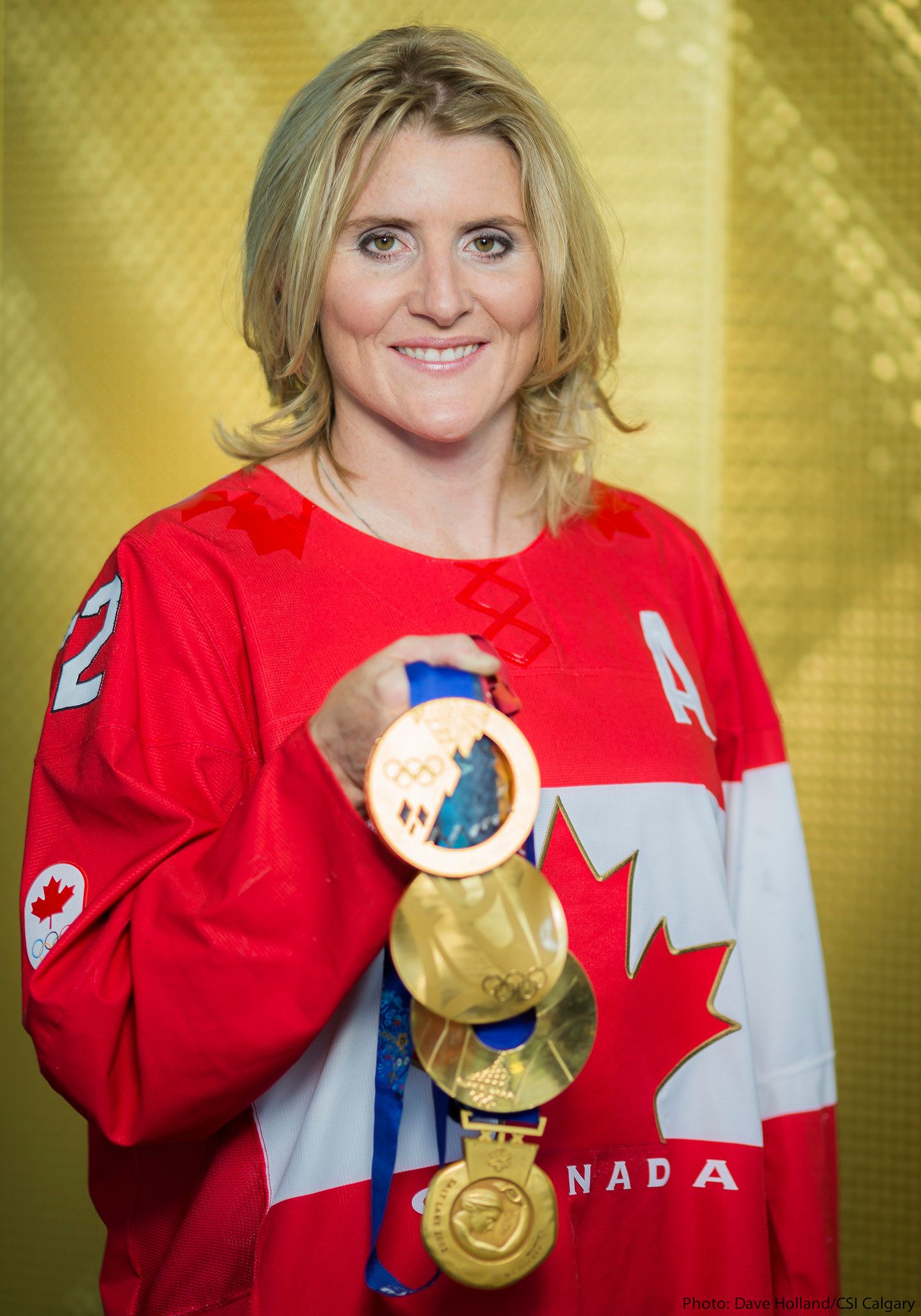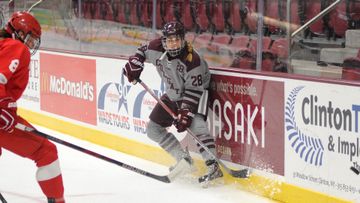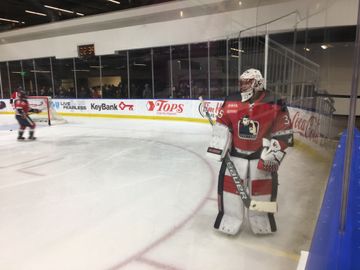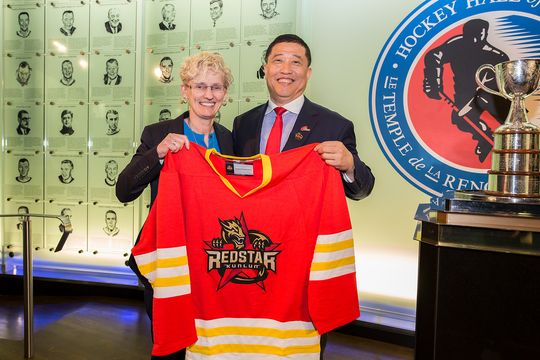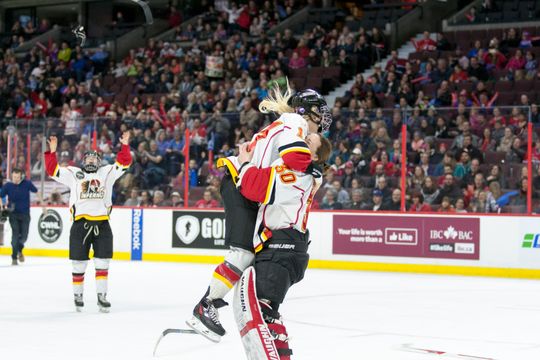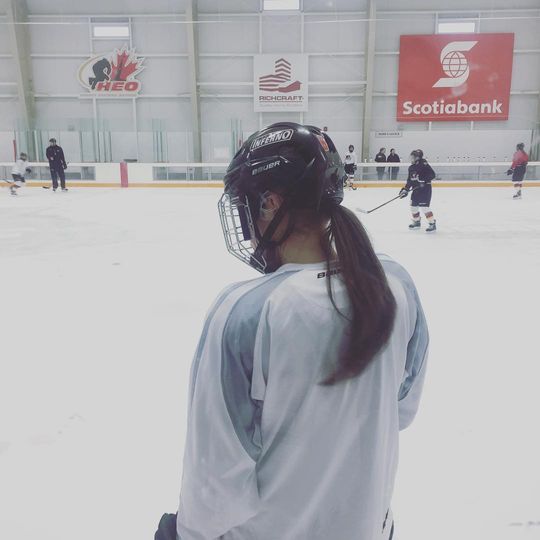I did not grow up with Hayley Wickenheiser. When she announced her retirement last week, unlike many hockey fans and journalists, I wasn't able to effectively look back on her career. My understanding of her 23 years of international play is secondhand; I've been graciously allowed to borrow context from Canadian friends and colleagues who grew up watching her wear the maple leaf. Wickenheiser played in five Winter Olympics and thirteen IIHF World Championships, and her performance on the ice speaks for itself. Like many top Canadian forwards in the game, she plays a physical style that's punctuated by a hard shot, and her handwork seems to have only gotten better as she has aged. As a playmaker, she's one of the best you'll ever see; she has a habit of setting up the perfect scoring opportunities for her teammates before the opposing defense has even realized that she has the puck.
For the 2015-16 season of the Canadian Women's Hockey League, Wickenheiser joined the Calgary Inferno. The Inferno have become an informal conditioning assignment for the Canadian women's national team. As the only western pro hockey team, they play in close proximity to Hockey Canada headquarters, and a lot of players training in earnest for the Olympics will find themselves in Calgary. Wickenheiser coming to the Inferno felt like a declaration of intent to continue playing and prepare for the 2018 Olympics, if possible.
In March of 2016, she added a Clarkson Cup championship with Calgary to her already-long list of achievements, and that was the first and only time I actually got to see her play in person. While I already knew what an impressive player she was, what struck me was her attitude, behavior, and intensity in the postgame media scrum. Ever the hockey ambassador, Wickenheiser, perhaps knowing that she was at the end of her playing career, was able to speak candidly to the media about their role in what we in women's hockey call "growing the game."
"I do see a future -- there's a couple key things that have to happen. We need more television. It's good to see all of you [the media] here. But -- more than just one game. And the NHL, we need them to step up and be more invested in this league and in the women's game," she said. Her take on this subject isn't necessarily unique, but the conviction with which she said it -- and the willingness that she had to speak directly to the press in the room about their own role -- made an impression. It is ironic that the NHL took a significant amount of time to honor her, trotting out Wayne Gretzky at an Oilers game to pay tribute to her long and storied career, but has done little to actually promote women's professional hockey as anything other than a novelty.
This lack of acknowledgment has to do with the narrative prestige that writers, journalists, and commentators afford different types of athletes. The tonal framing of their stories does so much to inform the public's perception, and for women's hockey, there are a few patterns that are almost always followed by the mainstream press.
For example, they can't resist comparing women's hockey to men's hockey -- rather than describing the game on the ice, much writing on the subject resorts to lazy similes. (Gretzky calling Wick a "female Gordie Howe" is just one of many examples.) Vagueness is key to minimizing the achievements of athletes outside of the NHL pipeline. When the NHL publishes the headline "Hayley Wickenheiser gets tribute after retirement," it centers the NHL giving the tribute as the key action -- not Hayley Wickenheiser's arsenal of medals and crucial role in elevating the sport. A search of NHL.com shows no coverage of Wickenheiser's achievements outside of Olympic years, and other hockey news outlets are not much better.
How can readers be expected to fully understand her story if it is characterized by these four-year gaps? We ask this question about every aspect of the women's game, and frequently, to the point that "Why is it only every four years?" is practically a cliche. But, on some level, we already know why, and so does Hayley Wickenheiser.
We live in a capitalist society, and our news media reflects that capitalism incredibly well. Sports is no exception. Sports is an entertainment industry and it makes money on the virtue of what we perceive to be its quality product: not necessarily the quality of the game on the playing surface, but its production value. We trade in intangibles when trying to make money with sports -- we are interested in aesthetic, in atmosphere, in experience. We who watch the game know that women's hockey is a good experience, but it's not a moneymaking experience.
To make money with it, we end up trying to elevate it to the level of the men's game, and the mistake there is evident: the men's game is not an elevation of experience, but rather a disconnect between the production value and the experience. It's extremely difficult to maintain a skilled, high-intensity game in the NHL over the course of an 82-game regular season, and harder still when the very tenets of what makes hockey good and fun to watch are being fiercely debated. We read heartening stories about the crisis of player safety and head injuries and violence; we look at advanced stats and see the beauty in the mathematical representations of a great hockey game, as well as the garish anomalies. We've assigned narrative prestige to men's hockey not because it is necessarily good, but because we are given mainstream access to it, and because it has a high production value and an abundance of information.
Those who want to "grow the game" in women's hockey are trying to expand access and heighten the production value of the sport, but we don't yet know what end this is a means to achieve. It wouldn't be ideal to follow directly in the footsteps of men's hockey, where the experience's monetary value is erroneously conflated with its quality. But we won't know what shape this takes until it happens, and two steps forward in this regard is often accompanied by at least one step back.
We do still need reporters at more than one game a year, like Wickenheiser told us all at the Canadian Tire Centre last March. Her comment spoke to assigning narrative prestige to women's hockey without divorcing it from its reality. To be a good women's sports reporter isn't just to be on a sports beat; it's to be a documentarian at the intersection of sports, gender, capitalism, and storytelling. That's the narrative prestige that we're aspiring to convey.
I'll be back for the Clarkson Cup Final for the third year in a row this year. It'll be the second consecutive year that the Final has been held in Ottawa and the second year that the North American women's hockey media will converge on an NHL team's press box. You get a higher level of narrative prestige just being in that building -- being able to see the whole ice, for starters, unlike craning your neck while freezing your ass off at a community rink with no media level. You get the bright lights, the loud music, and the Tim Horton's in the concourse.
Narrative prestige comes at a cost, and it's imperative to not make it a race to the top or a fight for the best resources. We can truly share good stories about our sport by doing the participatory work to elevate our coverage. Hayley Wickenheiser's message to the media, and her own status as an icon in women's sports, has always been about doing the work. Honoring her legacy and paying tribute to the significance of her career means framing the end of her professional career as the end of an era, but also as a beginning and an opportunity.
It's an opportunity to show up for more than one game, and to pay attention to each player of any gender who grew up watching Wick win gold medals for Canada. There's more than one chapter to this story, and if you want to start off with Wickenheiser's chapter, it's beneficial to pay attention to her own words and see her in the context that she has created for herself, by necessity.
She told you to step up. You should listen.
(Photo credit: Simon Fraser University/Flickr)
